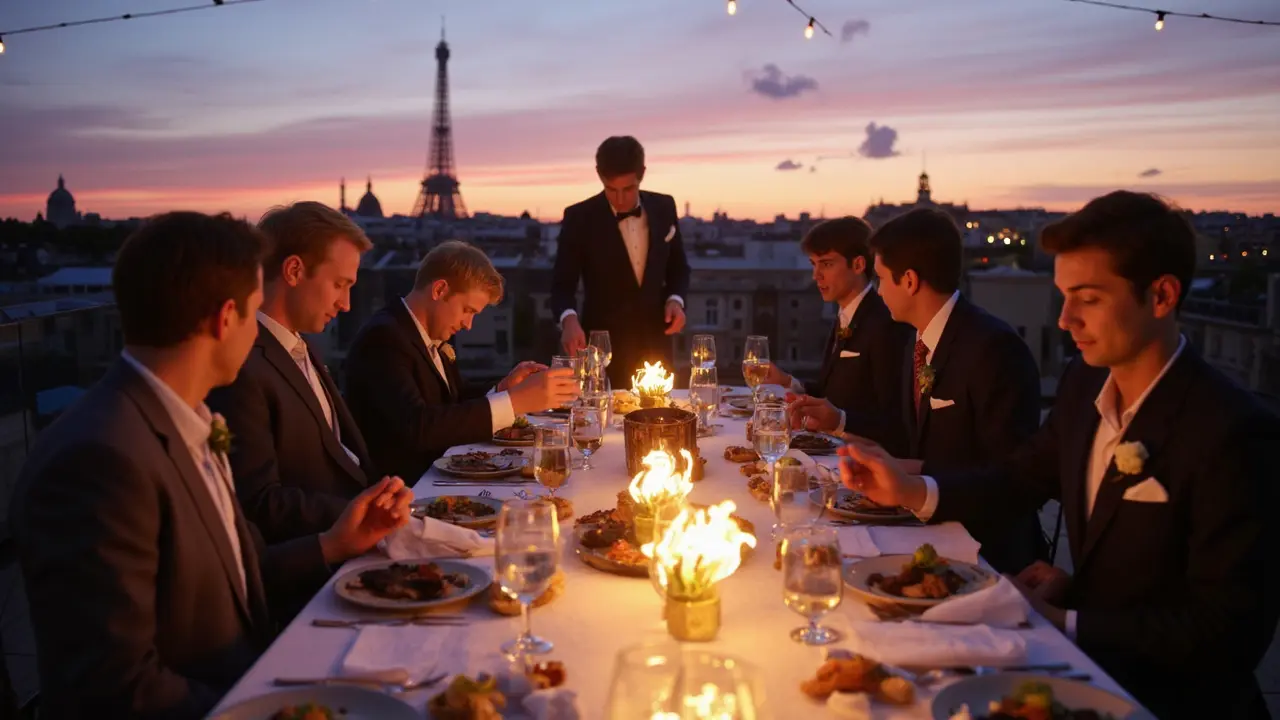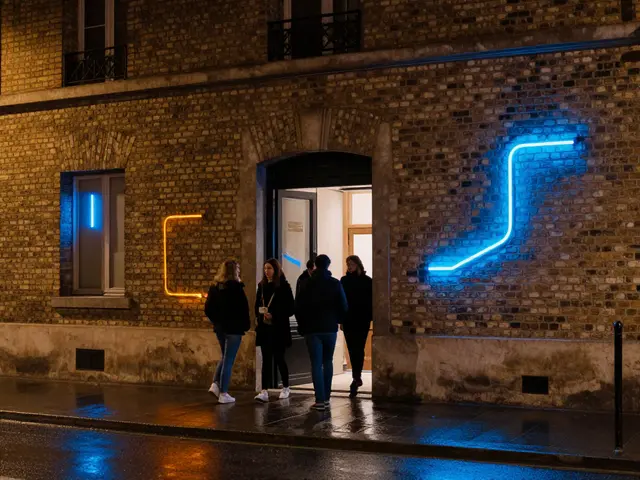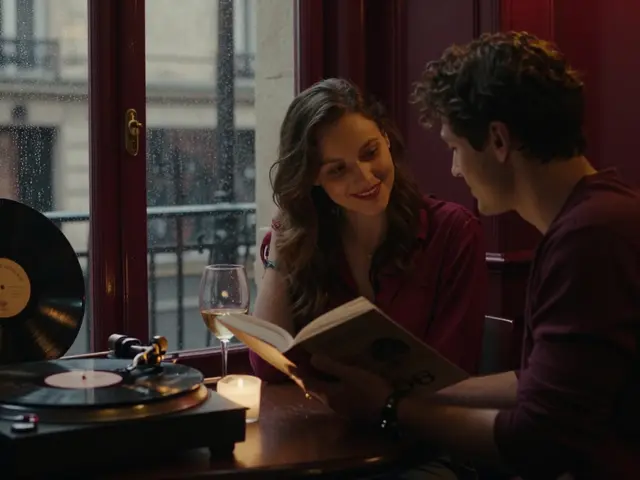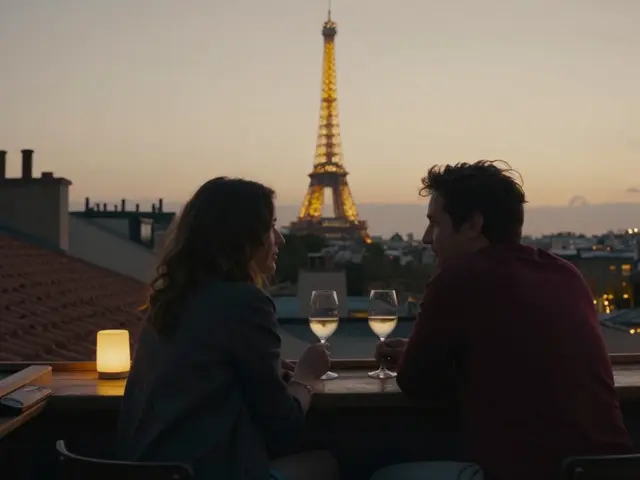You want a Paris bachelor weekend that actually delivers: no lines that eat your night, no overpriced tourist traps, and a lineup the groom will still talk about at the ten-year reunion. Here’s the no-BS playbook with the best spots, smart sequencing, and the budgets you’ll need in 2025. I live here, I host groups, and I’ve tested these so you don’t have to. If you’re after a bachelor party Paris that mixes big-night energy with effortless flow, you’re in the right place.
- TL;DR: Lock one daytime anchor (karting, axe throwing, or a private cruise), one dinner with group menus, and one late-night club with a table. Fill gaps with rooftops, wine bars, and a cabaret for a Paris-only moment.
- Budget: €150-€300 per person per day covers quality food + two activities + one late-night. Tables start €220-€350 for base spirits in mainstream clubs.
- Timing: Book hot dinners and cabaret 2-4 weeks out; clubs 5-10 days out for a table; day stuff 1-3 weeks out.
- Logistics: Metro runs late Fri-Sat (~2:15 a.m., RATP). Noctilien night buses cover after-hours. Budget for rideshares after 1:30 a.m.
- Vibe control: Keep the group close-stick to 1-2 neighborhoods per night to avoid blowing time in traffic.
How to choose your Paris bachelor plan (so the night doesn’t choose you)
Start with the jobs you actually need to get done: 1) one unforgettable headliner for the groom, 2) food that doesn’t break the budget, 3) a crowd-pleaser bar hop, 4) a legit club entry plan, and 5) simple transport between them. If you nail those, the rest is gravy.
Decision criteria that matter in Paris:
- Group size: If you’re 8-12, you’ll want dinner reservations, pre-booked activities, and a club table. For 3-6, go flexible-walk-ins at cocktail bars, buy tickets at the door.
- Neighborhood clustering: Keep pregame and club within a 10-15 minute ride. Marais + Bastille is seamless. Champs-Élysées + 8th works for big clubs. For canal-side afternoons, Canal Saint-Martin + Belleville bars pair well.
- Music taste: Techno/house? Paris delivers (warehouse vibes and heritage clubs). Urban/Latin? You’ll find mixed-format rooms, but you need to check the night’s promoter. Commercial bangers? Go west (8th/Champs-Élysées set).
- Dress code and door policy: White sneakers are fine in many spots, but avoid sports jerseys, shorts, and loud costumes. Club doors prefer smart-casual, tidy groups, and balanced energy. Split big groups into two for the door.
- Budget tiers (per person per day): Saver €120-€180, Standard €180-€260, Splash €260-€400+. The jump from “solid” to “unreal” is usually a table and one premium activity (cabaret or private cruise).
Reality checks for 2025:
- Transport: RATP schedules list last trains ~1:15 a.m. weekdays and ~2:15 a.m. Fri-Sat; Noctilien buses fill the gap overnight. Budget rideshares for the end of night.
- Smoking: France bans smoking inside bars/clubs (Code de la Santé Publique). Vaping rules generally follow-expect to step outside.
- Noise & terraces: Outdoor terraces thin out after midnight in residential streets. Rooftops mostly close by 1-2 a.m., then you head to clubs.
Top daytime picks that set the tone
Daytime is where you build inside jokes and burn off the travel cobwebs. Keep it punchy, competitive, and not too far from your evening base.
- Outdoor karting (Île-de-France circuits): Go-karts with proper speed, timed heats, podium pics. Expect €45-€70 pp for 2-3 sessions. Book 1-3 weeks ahead for a weekend slot. Add a bus transfer if you’re outside the city ring road.
- Axe throwing (central Paris ranges): Shockingly good icebreaker. 1-2 hour sessions, instructor-led games, beer available at many spots. €20-€30 pp. Easy to stack before dinner.
- Private Seine river cruise (small yacht or classic boat): Nothing says “we did Paris right” like your own boat. Bring a playlist and snacks if allowed. ~€25-€60 pp depending on group size and duration. Sunset slots go first-lock 2-4 weeks out.
- Bubble football or five-a-side: Light chaos, big laughs, minimal planning. €15-€35 pp. Combine with a canal picnic for a low-spend afternoon.
- Wine tasting with a sommelier: 60-90 minutes, 4-6 pours, French regions tour without leaving town. €35-€70 pp. This plays well before a steakhouse dinner.
- Cooking class (bistro basics or pastry): Hands-on and surprisingly competitive-perfect if the groom’s a foodie. €65-€120 pp. You eat what you make; that’s your lunch solved.
- Street art tour + craft beer crawl (Belleville / 13th): Two hours light walking, finish at a microbrewery. Good for mixed-interest groups and easy on the wallet.
Heuristic that works: one “move-the-needle” daytime anchor each day, then leave a 2-hour chill zone before dinner. Your future self will thank you.

Where to eat and pregame without wrecking the budget
Paris feeding a hungry group can go sideways fast if you walk in blind. The move is a fixed menu or a place used to groups, then a bar hop with room to breathe.
- Group-friendly bistros (classic set menus): Expect €28-€45 pp for starter+main+dessert at neighborhood spots. Book a week ahead for weekend slots and tell them your arrival window. Red meat eaters? Aim for steak-frites houses near Grands Boulevards or Bastille.
- Modern food halls (shared tables, many vendors): Frictionless, tasty, and forgiving for late arrivals. Great pregame environment; everyone grabs what they want. Drinks at bar prices, not club prices.
- Steakhouses and rotisseries: Carnivore-safe choices, reliable portions, and steady pacing. Bottle of Côtes-du-Rhône flows; nobody complains.
- Rooftops with a view (seasonal): Le Perchoir family, riverside pop-ups, or Seine barges for golden-hour photos. Cocktails €14-€18, beers €7-€10. Book lists open midweek; arrive early for sunset.
- Sophisticated cocktail bars (Marais / South Pigalle): Think speakeasy vibes, great ice, loud enough to feel alive but you can still talk. Split the group if you’re 10+; cap it at 6-8 per seating for the better spots.
- Sports bars for a match: If the weekend clashes with football or rugby, reserve a table. Wings, pitchers, and the game, then head straight into the night.
Money sanity check for 2025: good cocktails run €13-€20, pints €7-€10, decent wine by the bottle €24-€45. Ask for a group menu at dinner so you’re not reconciling 14 separate orders in three languages.
Nightlife heavy hitters: clubs, cabaret, and late-night bars
This is where Paris earns the flight cost. Anchor one big-ticket show or club table, then let the night flow around it.
- Cabaret (iconic Paris-only moment): High-production shows with choreography, live music, and the kind of staging you’ll never find at home. Budget €80-€180 pp depending on seating and champagne add-ons. Book 2-4 weeks out for Saturday prime time. House rules: no touching performers, dress up a notch, and enjoy the spectacle.
- Big-room clubs (8th arrondissement / Champs-Élysées zone): Commercial house, hip-hop/Latin crossover, fashion-forward crowd. Bottles typically €220-€350, mixers extra. Table gets you in, keeps you together, and saves you the door drama. Doors like tidy groups, no costumes.
- Historic electronic clubs (central / east): Techno and house nights that attract real heads. If the groom loves a proper system and DJs, this is your lane. Check the promoter line-up; buy tickets in advance if there’s a headliner. Sneakers welcome, still dress neat.
- Late-night dive/party bars (Bastille, Oberkampf, Pigalle): Cheaper drinks, sticky floors, 00s singalongs-exactly what some groups want after a fancier dinner. Good plan B if door policies are tight elsewhere.
- Strip bars and adult venues: Paris has a handful. Keep it respectful and legal: door fees vary, drinks are premium, private dances are regulated, and you don’t touch performers. Card minimums apply; read the menu before ordering bottles.
Pro tips you’ll wish you had:
- Door flow: Don’t arrive as a single 14-man phalanx. Split into two groups, spaced 3-5 minutes apart. Keep the vibe calm and the volume down at the door.
- Dress simple: Dark jeans or trousers, clean sneakers or dress shoes, solid shirts. Leave the novelty costumes for photos earlier in the day.
- Table math: One base bottle per 4-5 people to start. Add on after the first hour if needed. Have your payment method ready-one card, one payer, sort up later.
- Exit strategy: Save the venue’s closing time and last metro on your notes. After 2 a.m., rideshare surge is real; consider night buses or walk to a well-lit boulevard for pickups.

Itineraries, budgets, comparison table, and your booking checklist
Two plug-and-play plans that work in 2025 without heroics.
Sample Itinerary A: Bold and polished (Marais → 8th)
- Afternoon: Private Seine cruise (sunset slot). Pop a bottle, get your city shots.
- Early evening: Reservation at a modern bistro (group set menu). Keep it to 90 minutes.
- Pregame: Stylish cocktail bar in the Marais. Two rounds, split the group if 10+.
- Late: Big-room club near Champs-Élysées with a table. One base bottle per 4-5 guys, top-up after 1 a.m.
Budget: €220-€320 pp for the day depending on cruise size and bottle choice.
Sample Itinerary B: Gritty, high-energy (Belleville → Bastille)
- Afternoon: Axe throwing league-style session.
- Early evening: Food hall rally-everyone eats what they want, beers at the table.
- Pregame: Lively dive bar with room for a big group.
- Late: Historic electronic club or party bar crawl depending on the groom’s taste.
Budget: €140-€220 pp with no table, more if you add a cabaret.
Quick comparison: what fits your crew
| Pick | Typical Cost (pp) | Lead Time | Dress Code | Best For | Time Window | Notes |
|---|---|---|---|---|---|---|
| Private Seine Cruise | €25-€60 | 2-4 weeks | Smart casual | Photos, mixed groups | Late afternoon-sunset | BYO snacks often ok; check boat policy |
| Karting | €45-€70 | 1-3 weeks | Casual | Competitive crews | Daytime | Plan transfers if outside city |
| Axe Throwing | €20-€30 | 3-10 days | Casual | Icebreakers | Afternoon/early evening | Great before dinner |
| Cabaret | €80-€180 | 2-4 weeks | Dressy | Paris-only wow | Evening shows | Strict seating times |
| Rooftop Bar | €15-€30 (2 drinks) | 2-7 days | Smart casual | Sunset vibes | Golden hour-1 a.m. | Seasonal; queues at sunset |
| Club Table (8th) | €40-€90 (share) | 5-10 days | Smart | Keep group together | 12 a.m.-5 a.m. | One bottle per 4-5 pax to start |
| Warehouse/Electronic Club | €15-€35 (ticket) | 3-14 days | Neat casual | Music-first crews | 12 a.m.-6 a.m. | Check promoter; buy tickets early |
Booking checklist (copy/paste)
- Group roster, dietary issues, shared payment plan agreed (one card for tables).
- Pick two neighborhoods for each night; map walking and rideshare times.
- Lock 1 daytime anchor + 1 dinner + 1 late-night anchor per day.
- Reserve dinner with a group set menu; confirm arrival window and cancellation terms.
- Club: decide on table vs. tickets; confirm min spend, arrival time, and ID requirements.
- Transport: note last metro for your line, save night bus routes, preload rideshare apps.
- Pack list: smart-casual outfit, clean sneakers/dress shoes, no sports jerseys, no costume at the door.
Best for / Not for
- Cabaret: Best for mixed groups and a groom who appreciates production value. Not for crews who only want club bangers.
- 8th arrondissement clubs: Best for bottle-service cohesion and mainstream hits. Not for strict techno fans.
- Electronic/warehouse: Best for music purists and late finishers. Not for early sleepers or dress-code maximalists.
- Food halls: Best for quick, budget-friendly dinner. Not for “only white tablecloths” diners.
- Axe/karting: Best for friendly competition. Not for crews with injuries or tight schedules.
Mini‑FAQ
How far in advance should we book? For a Saturday: cabaret and dinners 2-4 weeks out, club table 5-10 days, daytime 1-3 weeks. Smaller Friday groups can sometimes get away with 3-5 days.
What are realistic drink prices? Cocktails €13-€20, pints €7-€10, club spirits €220-€350 per bottle. Plan on 2-3 rounds before the club, then share a bottle.
Can we wear costumes? Do it for photos earlier. Most quality clubs dislike big costumes at the door. Subtle props inside your jacket pocket are fine.
Is Paris safe late? Stick to lit streets and main boulevards, stay together, use licensed taxis/rideshare. Like any big city, keep phones/wallets zipped-especially in crowded lines.
Transport late at night? Metro ends ~1:15 a.m. weekdays and ~2:15 a.m. Fri-Sat (RATP). Noctilien night buses run all night. Rideshare is reliable; expect surge after 2 a.m.
Smoking and vaping rules? No smoking inside bars/clubs (French public health code). Many venues ask vapers to step outside too.
Scenarios & troubleshooting
- Large group (10-14): Book a table or two, split the door into two groups, pre-order a set menu at dinner. Nominate a treasurer and a timekeeper.
- Mixed tastes: Do cabaret + food hall + hybrid club night with both commercial and hip‑hop rooms. Everyone gets a win.
- Rain plan: Swap rooftop for a speakeasy; replace outdoor activity with axe throwing or a cooking class.
- Tight budget: Daytime: street art + beers, food hall dinner, ticketed club (no table). One premium moment (Seine cruise) across the whole weekend.
- Door rejection: Don’t argue. Walk two blocks, regroup, lower the volume, fix outfits (jackets zipped, hats off), and try the backup venue or go to your reserved table.
- Someone overcooks it early: Grab street food and water, sit them out for 45 minutes, rejoin at the next spot. No one wants to babysit in a club line.
Quick rule of thumb for a smooth weekend: 3-2-1. Three anchor bookings (one daytime, one dinner, one late-night) per day. Two flexible fillers (a rooftop and a bar). One backup for everything. You’ve now got a plan that bends, not breaks.
Last note on credibility and norms: RATP publishes metro and night-bus times; clubs and cabarets post dress codes and ticket rules the week of the event. French public health regulations cover smoking bans indoors. If you stick to those facts-and keep the group moving as one-you’ll get the Paris weekend you flew in for.







Perfect rundown for planning without the usual chaos - lock the anchors and let the rest fall into place, exactly.
The metro timing callouts and the 3-2-1 rule are clutch when you're corralling a crew that thinks spontaneity is the plan.
Hit the rooftop at golden hour, then the club with a table, and the night stays smooth instead of devolving into five separate taxi requests.
Also, for anyone budgeting: assume a surprise bottle or two; it always happens, and it's cheaper to plan for it than to scramble later. :)
Nice flow and totally agree with keeping things neighborhood-tight - that one tip alone saves hours and energy.
Splitting large groups at doors works like a charm; we've done it twice and never looked back.
Would add that a nominated treasurer is underrated - saves a ton of awkward math at 3 a.m.
This guide nails the psychology of group travel in a way that I wish I had known years ago when organizing similar trips for friends and family. The idea of one strong daytime anchor, one solid dinner, and a late-night anchor is elegant because it reduces decision fatigue and concentrates the memorable moments where they matter most.
When you design around anchors, you also create intentional downtime, which is where conversations deepen and small rituals form - the inside jokes, the nicknames, the traditions people carry forward. That quiet zone before dinner is not wasted time; it's the incubator for the night's energy.
Budgeting advice here is refreshingly realistic. Giving explicit per-person ranges removes the guesswork and helps set expectations before anyone commits financially. It also keeps the group cohesion intact because no one is blindsided by surprise costs in the moment.
Logistics details like RATP schedules and noctilien buses are small facts that prevent big problems. People underestimate how quickly a missed last train can cascade into ruined plans and stress. Those practical callouts are the unsung heroes of a good itinerary.
I also appreciate the cultural nods: smoking laws, dress codes, and terrace hours. These are the tiny social contracts that, when observed, make doors behave and locals nod their heads instead of rolling their eyes. Respecting venue norms keeps the vibe positive and reduces the chance of being bounced at the door.
One more thing that helped me in past weekends was building a flexible fallback list of three nearby venues for every night - a tight cluster of backups. If Plan A fails, Plan B is literally a five-minute walk away and nobody has to make a lonely decision alone. That was the real difference-maker on one rain-swept bachelor weekend that somehow turned into the best story of the trip.
Finally, the sample itineraries are adaptable templates rather than rigid prescriptions, which is exactly what groups need. They give structure but still permit personality and spontaneity. If a groom prefers music-first nights, swap in the warehouse club; if the crew wants polished photos, anchor the sunset cruise. The guide's modular approach is why this works for so many types of groups.
Overall: practical, respectful, and vivid without being prescriptive - a rare combo. Keep the anchors, carry water, and let the small stuff be flexible.
Listen - this is the kind of no-nonsense, get-it-done blueprint people should have been handing out for years. The split-group door tactic is a power move that separates the planners from the chaos-bringers.
Also, the price transparency here is unforgivingly helpful: calling out exact bottle ranges and table math stops the freeloaders in their tracks and keeps budgets honest and fair.
If you want the groom to actually remember the weekend for the right reasons, this is the operational backbone you need. No drama, fewer surprises, more photos that don't look like a disaster film.
Exactly...exactly...!!! this is..just the kind of list ppl shouldnt ignore..
Also..the dress rule!! omg, ive seen groups turned away because one idiot thought a jersey was 'funny'..
Keep it classy, always plan the treasurer (duh), and dont let the groom be the last to know the budget..
Solid playbook - loving the axe throwing + food hall combo, that mix hits different :)
I once shoved an extra set of socks into my carry on and it saved a mate from blister meltdown mid-pub crawl, so add that to the list of tiny lifesavers lol :)
Also, be loud but not that idiot-gets-you-booted loud - balance is key :D
This guide is pragmatic and kind to the group dynamic, which I appreciate from a planner's perspective. The focus on pacing and the recommendation to leave chill windows between anchors are excellent; they reduce burnout and increase enjoyment for everyone.
From an organizational standpoint, I would emphasize confirming dietary restrictions at the time of the dinner booking and reiterating the payment plan in writing before departure. It avoids awkwardness and ensures inclusivity.
Also, assign a calm point-person for any low-energy moments; someone gentle who can de-escalate and reframe the night is worth their weight in euros.
All this talk of anchors and scheduling is fine if your crew actually wants a curated memory rather than the theater of accidents most bachelor parties mistake for authenticity.
There is a subtle arrogance in assuming that booking a cabaret or a boat equals cultural immersion. It does not - it equals a shiny veneer that says you paid attention to aesthetics rather than meaning.
The philosophically interesting move is to design for constraint that encourages improvisation: pick one true anchor and leave two-thirds of the schedule porous. That creates room for serendipity without turning the weekend into a logistics dumpster fire.
Also, performative consumption - the idea that you must choose the most expensive bottle or the flashiest table to validate the experience - is a social affectation and it cheapens the group's memory. Cost does not always correlate with quality of recollection.
In short, be intentional but modest, and cultivate the conditions where stories can emerge rather than be purchased.
Operationally, the checklist is an excellent example of applied event heuristics; it condenses complex dependencies into a serializable action plan which is critical when scaling across participants who vary in engagement levels.
From a stakeholder management standpoint, the designation of a single payer for table settlements is a risk-reduction tactic that minimizes transaction friction and cognitive overhead during high-arousal time windows. This is what I call friction-point mitigation.
Also, the recommendation to cluster activities by neighborhood reduces travel latency, optimizes participant throughput, and limits stochastic variability in arrival times - all solid systems thinking applied to a social construct.
Concise, practical, and necessary.